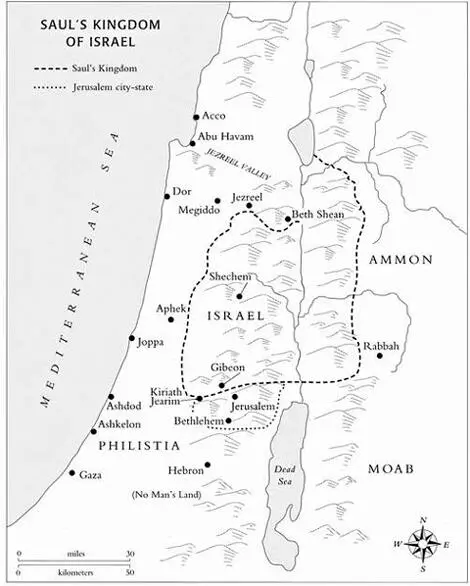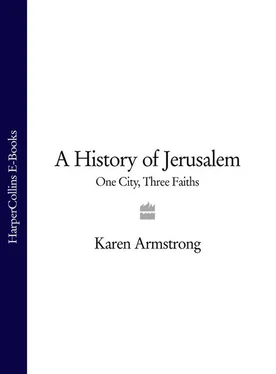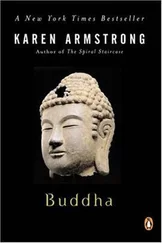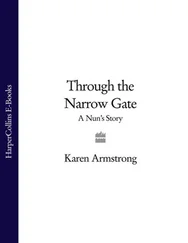By about 1030 BCE, the people of the northern hill country had a strong sense of kinship and solidarity. They thought of themselves as a distinct people with a common ancestry. They had been ruled till then by a series of “judges” or chieftains, but eventually they aspired to establish a monarchy like the other peoples of the region. The biblical authors have mixed feelings about this move. They show Samuel, the last of the judges, as bitterly opposed to the idea: he warns the people of the oppression and cruelty that a king would inflict upon them. 37But in fact the creation of the Kingdom of Israel was a natural and, perhaps, an inevitable development. 38The great powers in Assyria, Mesopotamia, and Egypt were in eclipse at this time, and other, smaller states had appeared to fill the power vacuum: Ammon, Moab, Edom. The Israelites found themselves surrounded by aggressive competitors who were eager to conquer the Canaanite highlands. Ammonites and Moabites infiltrated their territory from the east and the Philistines harried them from the west. On one occasion the Philistines sacked and destroyed the city of Shiloh, carrying off the Ark of the Covenant as a war trophy. They quickly returned it, however, once they experienced the deadly power of this palladium. Now that it was no longer protected by a shrine or a temple, the Israelites also found the sanctity of the Ark frightening, so they lodged it in a private house in Kireath-Jearim, on the border of their land. 39All this political turbulence probably convinced the Israelites that they needed the strong leadership of a king, and, reluctantly, Samuel anointed Saul of the tribe of Benjamin as the first King of Israel.
Saul ruled over a larger territory than any previous king in Canaan. It included the whole of the central highlands, on both sides of the Jordan, north of the city-state of Jerusalem, which was still ruled by the Jebusites. (See map.) In the Bible, Saul is a tragic figure: deserted by his God for daring to take initiative in a cultic matter, prey to paralyzing bouts of depression, and slowly watching his power ebb away. Yet even in this critical narrative, we can see that Saul’s achievements were considerable. Ruling from Gibeon, which contained the most important Yahwist temple in Israel, Saul steadily increased his territory, and the people of the hills joined him voluntarily. For nearly twenty years he was able to hold his kingdom against his enemies, until he and his son Jonathan were killed by the Philistines at the battle of Mount Gilboa in about 1010 BCE. After his death, he was eulogized in some of the most moving poetry in the Bible:

Saul and Jonathan, loved and lovely ,
neither in life, nor in death, were divided .
Swifter than eagles were they ,
stronger were they than lions . 40
This lament was sung not by one of Saul’s loyal followers but by a rebel who had fled his court. David had been a highly privileged warrior in Saul’s kingdom: he had been the intimate friend of Jonathan and had been given the hand of Michal, Saul’s daughter. He was the only one who could bring comfort to Saul in his depression, soothing away his despair with song and poetry. Yet, the biblical historians tell us, Saul had become jealous of David’s popularity and prestige, and David had to run for his life. First he had lived with a band of partisans as hapiru in the deserted hills to the south of Jerusalem. Finally he had allied himself with the Philistines, the deadly enemies of Israel. When he heard of Saul’s death, David of the tribe of Judah was living in the Negev town of Ziklag, which had been given to him by his new overlord, Achish, King of Gath. 41David is one of the most complex characters in the Bible. Poet, musician, warrior, rebel, traitor, adulterer, terrorist, he was certainly no paragon, even though—later—he would be revered as Israel’s ideal king. After Saul’s death, Ishbaal, the surviving son of Saul, ruled his father’s northern Kingdom of Israel, while David established a kingdom for himself in the sparsely inhabited southern hills, with a capital at Hebron. The Philistines may have encouraged this venture, since they would thus, through their vassal, have a toehold in the highlands. But David was playing a double game and had larger ambitions.
In Jerusalem, the Jebusites thus found themselves uncomfortably surrounded by two rival kingdoms: the Kingdom of Israel, ruled by Ishbaal, in the north, and the Kingdom of Judah, ruled by David, in the south. But Ishbaal was a weak ruler: his kingdom was probably smaller than Saul’s had been, and he antagonized his most important commander, who defected to David. Eventually, seven and a half years after David had been crowned king in Hebron, Ishbaal was murdered, and the assassins fled to David’s court. David’s hour had come. He carefully dissociated himself from Ishbaal’s death by having his murderers executed. As the husband of Saul’s daughter Michal, he had a tenuous claim to the throne of the Kingdom of Israel. Soon representatives of the tribes of the northern kingdom came to David, made a treaty with him in the Temple of Yahweh in Hebron, and anointed him King of Israel. David was now ruler of the United Kingdom of Israel and Judah. But in the middle of his territory was the Jebusite city-state of Jerusalem, which he intended to make his capital.
Конец ознакомительного фрагмента.
Текст предоставлен ООО «ЛитРес».
Прочитайте эту книгу целиком, купив полную легальную версию на ЛитРес.
Безопасно оплатить книгу можно банковской картой Visa, MasterCard, Maestro, со счета мобильного телефона, с платежного терминала, в салоне МТС или Связной, через PayPal, WebMoney, Яндекс.Деньги, QIWI Кошелек, бонусными картами или другим удобным Вам способом.













